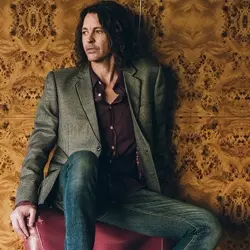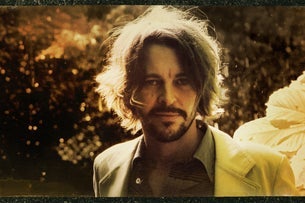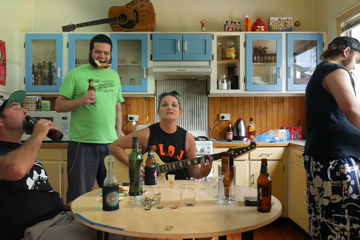 Bernard Fanning
Bernard FanningWhen Brisbane rock behemoth Powderfinger finally pulled up stumps on their incredible voyage at the tail-end of 2010, frontman Bernard Fanning was inevitably faced with the decision as to what to do next from a career perspective. Should he follow on with the rock aesthetic that had characterised his popular day job for so long, or pursue the folk leanings that had made his top-selling solo debut Tea & Sympathy – released amidst a Powderfinger hiatus back in 2005 – so successful, or perhaps even go off on an entirely new tangent? Before such important decisions were made, however, there was some life to live.
“I had a few months off,” the affable musician smiles in reminiscence. “We finished in October and I went overseas, just had some time off from music. My dad was crook so I went straight into that, and he ended up dying a few months after the Fingers finished. He'd been sick for a while – he had dementia, so he'd been crook for a few years – but that came a few months after the Fingers finished. We'd already planned to go overseas anyway, so we left a few months after that. So I had time off, but it wasn't tropical paradise time off.”
A break had been well-deserved – the final months of Powderfinger had been all gruelling road time, naturally compounded by the emotional strain of losing a loved one – but it wasn't long before Fanning was plotting the course for what would become his sophomore solo effort, Departures. The crux of the album was formulated in Madrid, where Fanning had relocated with his Spanish wife Andrea and their daughter Gabriella (and where son Freddie was subsequently born).
“Once I got to Madrid I just had like a month of fluffing around and getting organised, then I went and bought some speakers and got set up and got going. I didn't know what I was doing though; all I knew was that I wanted to learn how to use [songwriting software] GarageBand properly, and also to do some programming – some drum programming and loops and stuff. This was a first – I had a drum kit in my studio at Anstead so I'd never really needed to – but I did want to write different types of songs; I wanted to write stuff that was beyond my ability as a drummer, stuff that was actually funky and had groove,” he laughs. “It took a while – it's completely different – but I loved it, and it does make you write in a different way. My intention was to write from the beds – write the beds with drums and bass and see what happened over that, rather than appropriating that to a song that I'd written on guitar or piano or whatever.”
Don't miss a beat with our FREE daily newsletter
This new style of composition had a notable effect on the end product, the soul-flecked electronic flourishes of Departures – abetted by strong vocal turns and banks of harmonies – still sounding resolutely Fanning, yet somehow miles removed from anything that he's released before. Was it conscious to move away from the disparate sounds of Powderfinger or Tea & Sympathy?
“More Tea & Sympathy,” he proffers. “I was thinking about it as a solo artist, not thinking about it from a Powderfinger point of view, so I wanted it to be different to Tea & Sympathy. Not because I wanted to be perverse or be a dickhead about it, but I knew that if I wrote a record like that again, then I'd be 'that guy', and I just didn't want to be 'that guy' always. I'm quite happy to go back to being 'that guy' – especially if it sells a billion records like last time – but I want to be able to write anything.
“In Powderfinger you had to fit in to a certain extent with everybody's tastes, but with this I could just do anything. When I wrote Tea & Sympathy I wasn't in a very good emotional state – I'd been in a really long relationship and that broke down, and I was pretty mental – so it was really good for me to write a record then, it really helped me a lot. But I wasn't in that frame of mind at all this time – I'd just been married and had a kid, I'd just moved countries, it was like I'd got out of jail. It was a totally different feeling that I had, which is why [Departures] is fun, most of it. It's got that up energy to it, which was the idea, and I think that reflects how I was feeling as well.”
Even the decision to record Departures in LA – at the prestigious Sunset Sound studio, no less – with acclaimed producer Joe Chiccarelli (My Morning Jacket, The Raconteurs) and a bunch of acclaimed session musicians was an attempt to move out of a perceived musical comfort zone.
“It was really different, but it was good because Joe asked at the start, 'Do you want to bring people?', and I said, 'Look, one of the reasons that I want to do it with you is because I want to come just by myself and see what happens',” Fanning recalls. “I just wanted to see what it was like to work that way, with no one else there to lean on. Last time when I went to England [to make Tea & Sympathy], Bedge [Melbourne multi-instrumentalist John Bedggood] came with me, and he played fiddle and mandolin, he was an integral part of making the record sound different than if it had just been me. That's why I wanted to have people who were really great players, so they could take it all to somewhere else.
“I just said to Joe at the beginning of the process, 'Obviously it would be great to have these guys that you're talking about who are all great session players – or who were people in bands that I really liked or whatever – but basically I just don't want any knobs. I want it to be fun, and if possible I want them to have worked together before. I want them to be friends so we can have a good time, and people that you think I'll get along with as well'. And they were – they were just really cool dudes.
“But also part of the reason that we were [in LA] for three months, was that in the first month I wanted to see what it was like to write with other people. Same with having people in the studio that I didn't know, I wanted to go and write with people that I didn't know, and just see what happens. Everything was pretty much the opposite of what it was like being in Powderfinger – that was pretty much the idea – plus it was the opposite of what it was like to do Tea & Sympathy as well.”
Fortunately, with so much change afoot in Fanning's creative processes, whether or not he alienated his substantial existing fanbase with these new directions wasn't even on his radar.
“Even that consideration is a complete road to ruin. Thinking about what people think of your songs before you've written them... there's so many things to be paranoid about already, especially on that level of being popular – having been in a band as popular as Powderfinger, there's already a certain amount of negativity that gets directed toward you from within the music community, not from the wider community but from the general hater crew,” he smiles. ”But if you were going to worry about that, and then you were going to worry about the people who do like you or worry about people who might like you, and what will radio think, and how short should this song be – if you did that at the beginning of the process, you'd go insane.
“Nobody can afford to do it or else the situation becomes counter to why everybody begins to do it in the first place – because you want to make some shit up, because you want to sit there and invent something that hasn't been there before – and if you start having all these fences around it, it just sucks. And that's one of the things with Powderfinger that I found frustrating at the end, because everybody was starting to have different ideas about how things should happen musically, then you were starting to make considerations and compromises at that very early stage, and that to me is death. Design by consensus.”
Even the lyrical theme of change, prevalent throughout much of Departures, didn't become apparent to Fanning until after the event.
“There is [a theme] now that I've finished it and listened to it and gone, 'Oh okay, now I get it',” he admits. “But there wasn't one that was intentional, which is why it ended up being called Departures, because it was talking about those things: Powderfinger splitting, my Dad dying, us moving overseas and being away from home for the first time for an extended period. I mean I've been away touring for probably half of my adult life, but I was always coming home and this time I wasn't coming home. That's why it ended up being called Departures.”
















